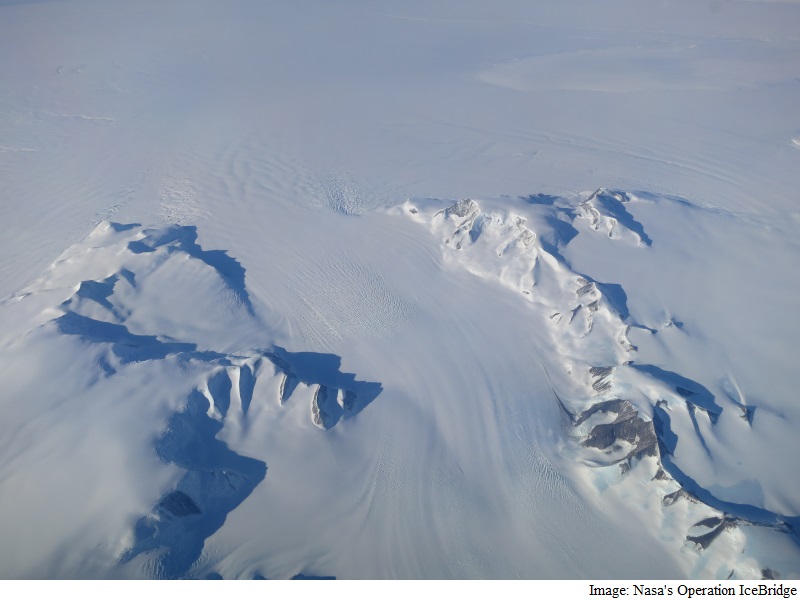- Home
- Science
- Science News
- Antarctic Ice Sheet Is Gaining Mass, Claims Nasa Study
Antarctic Ice Sheet Is Gaining Mass, Claims Nasa Study

Areas of the continent like the Antarctic peninsula have increased their mass loss in the last decades, says a new Nasa study.
The research challenges the conclusion of other studies, including Intergovernmental Panel on Climate Change's (IPCC) 2013 report which says that Antarctica is overall losing land ice.
According to the analysis of satellite data, the Antarctic ice sheet showed a net gain of 112 billion tonnes of ice a year from 1992 to 2001.
The net gain slowed to 82 billion tonnes of ice per year between 2003 and 2008.
"We are essentially in agreement with other studies that show an increase in ice discharge in the Antarctic peninsula and the Thwaites and Pine Island region of West Antarctica," explained Jay Zwally, glaciologist with Nasa Goddard Space Flight Centre in Greenbelt, Maryland.
Our main disagreement is for East Antarctica and the interior of West Antarctica.
"Here, we see an ice gain that exceeds the losses in the other areas," he added.
But it might take a few decades for Antarctica's growth to reverse, according to Zwally.
The study analysed changes in the surface height of the Antarctic ice sheet measured by radar altimeters on two European Space Agency satellites and by the laser altimeter on Nasa's Ice, Cloud, and land Elevation Satellite (ICESat).
"At the end of the last Ice Age, the air became warmer and carried more moisture across the continent, doubling the amount of snow dropped on the ice sheet," Zwally noted.
The extra snowfall that began 10,000 years ago has been slowly accumulating on the ice sheet and compacting into solid ice over millennia.
It is thickening the ice in east Antarctica and the interior of west Antarctica by an average of 0.7 inches per year.
This small thickening, sustained over thousands of years and spread over the vast expanse of these sectors of Antarctica, corresponds to a very large gain of ice.
"The good news is that Antarctica is not currently contributing to sea level rise, but is taking 0.23 mm per year away," Zwally said. But this is also bad news.
"If the 0.27 mm per year of sea level rise attributed to Antarctica in the IPCC report is not really coming from Antarctica, there must be some other contribution to sea level rise that is not accounted for," he pointed out in the study appeared in the Journal of Glaciology.
For details of the latest launches and news from Samsung, Xiaomi, Realme, OnePlus, Oppo and other companies at the Mobile World Congress in Barcelona, visit our MWC 2026 hub.
Related Stories
- Samsung Galaxy Unpacked 2026
- iPhone 17 Pro Max
- ChatGPT
- iOS 26
- Laptop Under 50000
- Smartwatch Under 10000
- Apple Vision Pro
- Oneplus 12
- OnePlus Nord CE 3 Lite 5G
- iPhone 13
- Xiaomi 14 Pro
- Oppo Find N3
- Tecno Spark Go (2023)
- Realme V30
- Best Phones Under 25000
- Samsung Galaxy S24 Series
- Cryptocurrency
- iQoo 12
- Samsung Galaxy S24 Ultra
- Giottus
- Samsung Galaxy Z Flip 5
- Apple 'Scary Fast'
- Housefull 5
- GoPro Hero 12 Black Review
- Invincible Season 2
- JioGlass
- HD Ready TV
- Latest Mobile Phones
- Compare Phones
- Nothing Phone 4a Pro
- Infinix Note 60 Ultra
- Nothing Phone 4a
- Honor 600 Lite
- Nubia Neo 5 GT
- Realme Narzo Power 5G
- Vivo X300 FE
- Tecno Pop X
- MacBook Neo
- MacBook Pro 16-Inch (M5 Max, 2026)
- Tecno Megapad 2
- Apple iPad Air 13-Inch (2026) Wi-Fi + Cellular
- Tecno Watch GT 1S
- Huawei Watch GT Runner 2
- Xiaomi QLED TV X Pro 75
- Haier H5E Series
- Asus ROG Ally
- Nintendo Switch Lite
- Haier 1.6 Ton 5 Star Inverter Split AC (HSU19G-MZAID5BN-INV)
- Haier 1.6 Ton 5 Star Inverter Split AC (HSU19G-MZAIM5BN-INV)

















